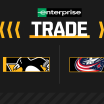Rutherford and Sullivan 2019 Locker Cleanout Transcript
Rutherford and Sullivan speak to the media
Going into the offseason, do you feel the window is still open for you to win a championship as is?
Rutherford: I don't think as is, but the window's still open. I think it should be open for more than just one year also. I'll say the obvious, based how things finished, we're not going to be able to do it the way we finished.
Sidney Crosby said the most frustrating thing about what happened is that you had a pretty good handle on what New York was going to do and they did it anyway. Why?
Sullivan: I think it's a couple of reasons. One, you've got to give the Islanders credit, they played a good series. I think to a certain extent we beat ourselves in a lot of circumstances with our lack of commitment to play the game the right way. We talk about this at length all season long, and to win in the playoffs you can't be a high-risk team. You've got to have a certain discipline to your game on both sides of the puck. It's not always about scoring goals. I know that there was a lot of talk about the fact that we didn't score. But when I look at the way the series was played out, it wasn't so much that we didn't score as it was some of the opportunities that we gave our opponent were high quality, and we didn't force them to have to work for it. As a result, when you give someone that many 2-on-1's, for example, those are pretty high-quality chances. NHL players are going to score. There's a certain discipline and certain diligence associated with winning at this time of year, and as a group we all have to take responsibility because we didn't live up to that.
With the offseason coming, can you describe your approach? How severe you think the changes have to be and what your outlook is?
Rutherford: I don't know yet, because we're still a little bit emotional with the disappointment in how this ended. I think the best thing for me to do is take a little time to think through this. I'm in the middle now of meeting with as many people that have input in our organization as I can, from the coaches to hockey ops to ownership. That will take a little time to work through that. And then some big decisions will have to be made. Obviously there will be changes in our team. I'm just going to talk a little bit more about Sully's answer, about playing the right way. When you look at our team this year, the inconsistency - we still got 100 points, but it wasn't a comfortable 100 points. Our team played as a team in March. We had a tough schedule. We had a lot of games. We played the game the right way, and that's when we played at our best. We were tracking towards being a good playoff team, then we ran up against a team that was more determined and played the game the right way and we played at a higher risk. It was there. We saw it in March. And it could certainly be there in the future. But it won't be the exact same team.
In the leadup to the 2016 and '17 seasons, a lot of the moves you made made your team faster. And it seems like a lot of moves since then have not necessarily done that. I just wonder your thoughts on that philosophy. Do you feel like that is something you need to get back to?
Rutherford: Have you been going to the games? Do you think (Jared) McCann and (Nick) Bjugstad can skate?
Reporter: I do.
Rutherford: So what's your point?
Reporter: Maybe on defense.
Rutherford: On defense? Okay. So who are you referring to on defense that we let go of that can skate better than the guys we have?
Reporter: (Trevor) Daley and say, (Ben) Lovejoy are better skaters than (Jack) Johnson and (Erik) Gudbranson.
Rutherford: (Laughs) Well, you're not making a lot of sense. I think our defense is probably the best now that it's been since I've been here as a group. You always like mobile defensemen, you like guys that can move the puck. We have at least one guy on each pairing that can move the puck. Now we got guys who can have some pushback. At one point in time, you asked me if we had enough guys that can push back. Now you're asking me if I have enough guys that can have speed. If you find those guys, they're making $15 million a year and there aren't any.
Jim, you have very few guys who are free agents this summer. Normally, that would be a good thing. But if you need to retool this roster, that could make your job difficult. What kind of a position does that put you in?
Rutherford: Not any different. I mean, we have a lot of good players and players who have good resumes - players that have won Stanley Cups and players that have contributed big to that. So, depending on what changes we decide to make, we have valuable assets to make some of those changes.
Mike, if the message stays the same about playing the right way, if the guys aren't playing the way you want them to be playing, is it just a matter now of being more accountable? Whether you hold them to accountability or they hold themselves to that?
Sullivan: I think it's a little bit of both. Certainly we'll go through a process as a coaching staff as we do every summer and we'll look at the league and some of the tendencies and how teams are playing in different aspects of their game. And (in terms of) what the quote unquote best practices are around the league, we go through that process after every season. We'll do that again as a coaching staff to see from a tactical standpoint if we need to adjust or change any of the system play or the strategies that we've tried to deploy here with our group. Having said that, we've tried to instill a game plan that would give our core players the best opportunity to have success based on their strengths. That's what we talked about from Day 1 when I became the head coach of this team. That's what we've tried to do season in and season out. But having said that, the challenge is to make sure that there's one hundred percent buy-in throughout the lineup. I think the area of our identity that we've lost a little bit is the 'hard to play against' aspect. We can look at past experiences to try and learn from, and we can look at the current experience to learn from. When we've had success as a group with this very same core of players, we were a team that could score goals. But I think what went unnoticed or really not discussed much was that we were hard to play against. We had back pressure on the puck. We had sticks. We defended hard. We limited opportunities at the net. There were all kinds of aspects of our game that made us a team that's difficult to play against. It's a long-winded answer to your question, but (when it comes to) the identity of this group, in order to have success, you have to become a team that's difficult to play against. Everybody has got to be held accountable to it. And everybody has got to take ownership for it.
Where do you feel you lost the buy-in?
Sullivan: It's a hard question to answer. Because we had periods of time where there was lots of buy-in and we got results as a result of it. I think what was frustrating from our coaching staff's standpoint, and I think an indication of it, is the inconsistency of our season. Just the consistency of day in and day out, game in and game out, playing the game the right way that gives us the best chance to win.
Does the process, the formula, the strategy, the personnel, the way you won in 2016 and '17 - is that still the objective going forward or are you sort of adjusting based off what you see is working, and do you have a firm idea yet of what the next championship run could look like in those regards?
Sullivan: Once again, I don't have a definitive answer for you at this point because I think part of this process is going through our own due diligence and trying to figure out what's the best way to play given this particular core group of players that we have. That's the discussion we've had ongoing as a coaching staff and with Jim season in and season out in trying to build a team that can support that core group and the style of play that we're trying to play. We'll look at that this offseason. And as I said, we'll go through our own due diligence as a coaching staff. We'll look at the league. We'll look at our own team and try to figure out are there areas of our game where we know we can be better? For sure. But do we need to change our strategies in order to try to maximize the group that we have.
Rutherford: In those years that you're referring to that we won, we were a team. We were a very tight-knit team. And I didn't see that this year from Day 1. I didn't see a point where our guys came together as a team. And I wonder if it's because there's too many guys content with where they're at in their careers after winning a couple of Stanley Cups. And is that a signal where some of that has to be changed, where you've got that eagerness again. There's a bunch of things that were different between the Islanders and the Penguins, and the reason that the Islanders won four straight is because they played the right way and they were eager to win. They were determined. And the Penguins weren't.

Can you talk about how you see the working relationship between the type of guys Jim acquires and the type of guys Mike wants to play? What's the give-and-take there and the dynamic?
Rutherford: Well, that working relationship is extremely good because I don't make any trades on my own. I don't decide just to trade for somebody and say, 'Hey Mike, there's going to be a couple of new guys in the room tomorrow, figure it out how to make them play.' Our staff is always together and a hundred percent in on any final decision I make on players that are brought in and players that we think can make our team better. And I think players that were added this year - (Marcus) Pettersson and McCann and Bjugstad and Gudbranson - in different ways, for what they bring and what they do best, have made our team better.
Sullivan: From my standpoint, I'm not sure I can add anything that Jim didn't already say. But I believe we've got a great working relationship. Jim is a good communicator. He encourages our input and our feedback. I do think that in all the discussions that we've had since we've been together, we tend to see the game a similar way. And given the group of players that we have and trying to maximize this group of players, with the core group that we have I think we share the same vision on how to play stylistically in order to maximize the group.
Mike, you talked about that stretch in March where you played the right way and got to that identity. 71 and 58 weren't around for a lot of that stretch. When they came back, did guys just get overconfident, like (Evgeni Malkin) and (Kris) Letang are going to do the things that they do so we can be riskier because they're going to score goals? Did they sort of just lose responsibility as a group because of that?
Sullivan: Well, listen - we can all speculate on why it's evolved the way it's evolved. The reality is you're trying to understand mindsets of players and mindsets of teams. Human nature is hard to figure out sometimes. That's one of the biggest challenges of coaching. But what I will say is that I think when key players go down, there's a certain level of urgency associated with the rest of the group that everybody's got to buckle down and make sure they play the right way because we can't win unless they do. And I think that we've got to try to apply that same mindset when we have a full complement of players and now we've got something. I think that's our challenge moving forward, is we have to become a team that part of its identity is a team that's difficult to play against and that means a lot of things. But when you look at the month of March as an example, I thought we were a team that was hard to play against. Our goals against was down. We limited odd-man rushes against. We made pretty good decisions with the puck. There was cooperative effort. And there was commitment and compete. That's what it takes to win.
Jim, Matt Murray has one more year on his contract after this year. You've sometimes done that ahead of time, like you did with Jake (Guentzel). Is that a priority for you, to get something done with Matt this summer?
Rutherford: I can't give you a good answer. I haven't got to that point to think about it. I have a number of other things to deal with first. But you're right, sometimes I do jump ahead on it. In due course I'll take a look at that.


















































